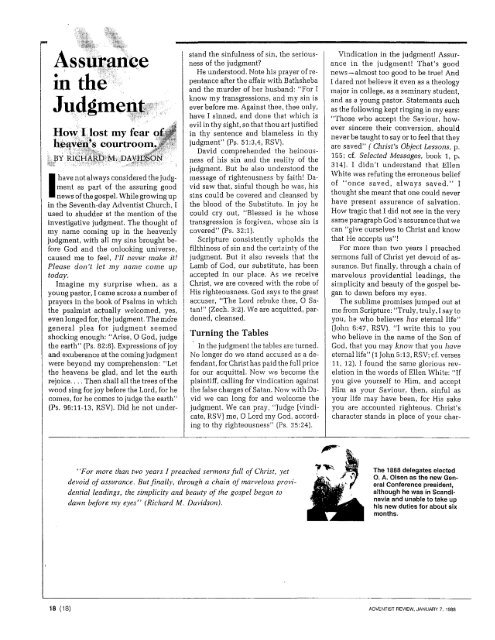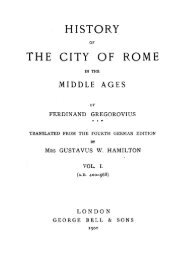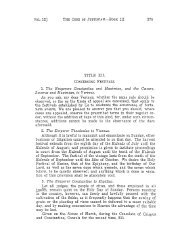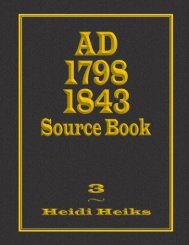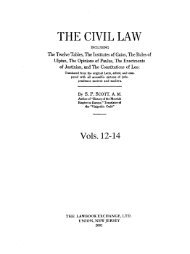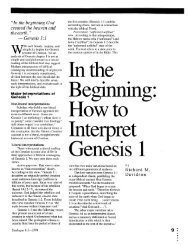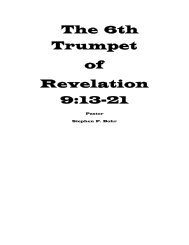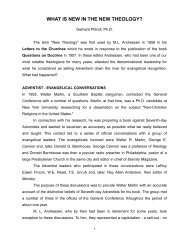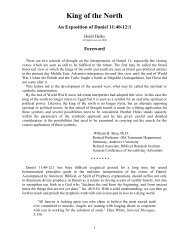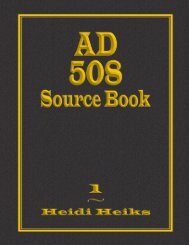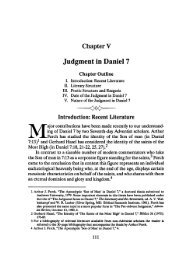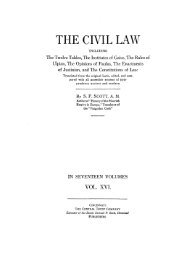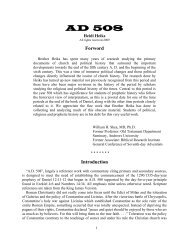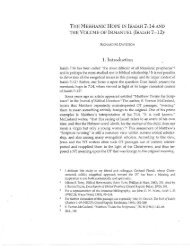Assurance in the Judgment
Assurance in the Judgment
Assurance in the Judgment
Create successful ePaper yourself
Turn your PDF publications into a flip-book with our unique Google optimized e-Paper software.
Ass...._......<br />
<strong>in</strong> th.<br />
Jq4gme<br />
How<br />
hea,<br />
,"BYR<br />
j&t*~r<br />
lost my fear 0<br />
.~ courtroom<br />
Ihave not always considered <strong>the</strong> judgment<br />
as part of <strong>the</strong> assur<strong>in</strong>g good<br />
news of<strong>the</strong> gospel. While grow<strong>in</strong>g up<br />
<strong>in</strong> <strong>the</strong> Seventh-day Adventist Church, I<br />
used to shudder at <strong>the</strong> mention of <strong>the</strong><br />
<strong>in</strong>vestigative judgment. The thought of<br />
my name com<strong>in</strong>g up <strong>in</strong> <strong>the</strong> heavenly<br />
judgment, with all my s<strong>in</strong>s brought before<br />
God and <strong>the</strong> onlook<strong>in</strong>g universe,<br />
caused me to feel, I'll never make it!<br />
Please don't let my name come up<br />
today.<br />
Imag<strong>in</strong>e my surprise when, as a<br />
young pastor, I came across a number of<br />
prayers <strong>in</strong> <strong>the</strong> book of Psalms <strong>in</strong> which<br />
<strong>the</strong> psalmist actually welcomed, yes,<br />
even longed for, <strong>the</strong> judgment. The more<br />
general plea for judgment seemed<br />
shock<strong>in</strong>g enough: "Arise, 0 God, judge<br />
<strong>the</strong> earth" (Ps. 82:8). Expressions of joy<br />
and exuberance at <strong>the</strong> com<strong>in</strong>g judgment<br />
were beyond my comprehension: "Let<br />
<strong>the</strong> heavens be glad, and let <strong>the</strong> earth<br />
rejoice.... Then shall all <strong>the</strong> trees of<strong>the</strong><br />
wood s<strong>in</strong>g for joy before <strong>the</strong> Lord, for he<br />
comes, for he comes to judge <strong>the</strong> earth"<br />
(Ps. 96:11-13, RSV). Did he not under-<br />
stand <strong>the</strong> s<strong>in</strong>fulness of s<strong>in</strong>, <strong>the</strong> seriousness<br />
of <strong>the</strong> judgment?<br />
He understood. Note his prayer ohepantance<br />
after tha affair with Bathsheba<br />
and <strong>the</strong> murder of her husband: "For I<br />
know my transgressions, and my s<strong>in</strong> is<br />
ever before me. Aga<strong>in</strong>st <strong>the</strong>e, <strong>the</strong>e only,<br />
have I s<strong>in</strong>ned, and done that which is<br />
evil <strong>in</strong> thy sight, so that thou art justified<br />
<strong>in</strong> thy sentence and blameless <strong>in</strong> thy<br />
judgment" (Pl>. 51:3,4, RSV).<br />
David comprehended <strong>the</strong> he<strong>in</strong>ousness<br />
of his s<strong>in</strong> and <strong>the</strong> reality of <strong>the</strong><br />
judgment. But he also understood <strong>the</strong><br />
message of righteousness by faith! David<br />
saw that, s<strong>in</strong>ful though he was, his<br />
s<strong>in</strong>s could be covered and cleansed by<br />
<strong>the</strong> blood of <strong>the</strong> Substitute. In joy he<br />
could cry out, "Blessed is he whose<br />
transgression is forgiven, whose s<strong>in</strong> is<br />
covered" (Ps. 32:1).<br />
Scripture consistently upholds <strong>the</strong><br />
filth<strong>in</strong>ess of s<strong>in</strong> and <strong>the</strong> certa<strong>in</strong>ty of <strong>the</strong><br />
judgment. But it also reveals that <strong>the</strong><br />
Lamb of God, our substitute, has been<br />
accepted <strong>in</strong> our place. As we receive<br />
Christ, we are covered with <strong>the</strong> robe of<br />
His righteousness. God says to <strong>the</strong> great<br />
accuser, "The Lord rebuke <strong>the</strong>e, 0 Sa·<br />
tan!" (Zech. 3:2). We are acquitted, par·<br />
doned, cleansed.<br />
Turn<strong>in</strong>g <strong>the</strong> Tables<br />
In <strong>the</strong> judgment <strong>the</strong> tables are turned.<br />
No longer do we stand accused as a defendant,<br />
for Christ has paid <strong>the</strong> full price<br />
for our acquittal. Now we become <strong>the</strong><br />
pla<strong>in</strong>tiff, call<strong>in</strong>g for v<strong>in</strong>dication aga<strong>in</strong>st<br />
<strong>the</strong> false charges of Satan. Now with David<br />
we can long for and welcome <strong>the</strong><br />
judgment. We can pray, "Judge (\r<strong>in</strong>dicate,<br />
RSVj me, 0 Lord my God, accord<strong>in</strong>g<br />
to thy righteousness" (Ps. 35:24).<br />
V<strong>in</strong>dication <strong>in</strong> <strong>the</strong> judgment! <strong>Assurance</strong><br />
<strong>in</strong> <strong>the</strong> judgment! That's good<br />
news-almost too good to be true! And<br />
I dared not believe it even as a <strong>the</strong>ology<br />
major <strong>in</strong> college, as a sem<strong>in</strong>ary student,<br />
and as a young pastor. Statements such<br />
as <strong>the</strong> follow<strong>in</strong>g kept r<strong>in</strong>g<strong>in</strong>g <strong>in</strong> my ears:<br />
"Those who accept <strong>the</strong> Saviour, however<br />
s<strong>in</strong>cere <strong>the</strong>ir conversion, should<br />
never be taught to say or to feel that <strong>the</strong>y<br />
are saved" ( Christ's Object Lessons, p.<br />
155; d. Selected Messages, book 1, p.<br />
314). I didn't understand that Ellen<br />
White was refut<strong>in</strong>g <strong>the</strong> erroneous belief<br />
of "once saved, always saved." I<br />
thought she meant that one could never<br />
have present assurance of salvation.<br />
How tragic that I did not see <strong>in</strong> <strong>the</strong> very<br />
same paragraph God's assurance that we<br />
can "give ourselves to Christ and know<br />
that He accepts us"!<br />
For more than two years I preached<br />
sermons full of Christ yet devoid of assurance.<br />
But f<strong>in</strong>ally, through a cha<strong>in</strong> of<br />
marvelous providential lead<strong>in</strong>gs, <strong>the</strong><br />
simplicity and beauty of <strong>the</strong> gospel began<br />
to dawn before my eyes.<br />
The sublime promises jumped out at<br />
me from Scripture: "Truly, truly, I say to<br />
you, he who believes has eternal life"<br />
Oohn 6:47, RSV). "I write this to you<br />
who believe <strong>in</strong> <strong>the</strong> name of <strong>the</strong> Son of<br />
God, that you may know that you have<br />
eternal life" (1 John 5:13, RSV; cf. verses<br />
11,12). I found <strong>the</strong> same glorious revelation<br />
<strong>in</strong> <strong>the</strong> words of Ellen White: "If<br />
you give yourself to Him, and accept<br />
Him as your Saviour, <strong>the</strong>n, s<strong>in</strong>ful as<br />
you~ life may have been, for His sake<br />
you are accounted righteous. Christ's<br />
character stands <strong>in</strong> place of your char-<br />
"For more than two years I preached sermons full of Christ, yet<br />
devoid of assurance. But f<strong>in</strong>ally, through a cha<strong>in</strong> ofmarvelous providentiallead<strong>in</strong>gs,<br />
<strong>the</strong> simplicity and beauty of <strong>the</strong> gospel began to<br />
dawn before my eyes" (Richard M. Davidson).<br />
The 1888 delegates elected<br />
O. A. Olsen as <strong>the</strong> new General<br />
Conference president,<br />
although he was <strong>in</strong> Scandi·<br />
navia and unable to take up<br />
his new duties for about six<br />
months.<br />
18 (18) ADVENTIST REVIEW. JANUARY 7. 1988
y some Adventists <strong>in</strong> recent years. But<br />
<strong>the</strong> biblical evidence forthcom<strong>in</strong>g (es·<br />
pecially s<strong>in</strong>ce 1980) from <strong>the</strong> Daniel and<br />
Revelation Committee and o<strong>the</strong>r<br />
sources is persuasive: it is not a matter<br />
of choos<strong>in</strong>g ei<strong>the</strong>r Christian assurance<br />
or <strong>the</strong> <strong>in</strong>vestigative judgment. Both are<br />
solid biblical doctr<strong>in</strong>es. What is more,<br />
<strong>the</strong> judgment <strong>in</strong>volves an exam<strong>in</strong>ation<br />
of<strong>the</strong> sa<strong>in</strong>ts' works, as Adventists have<br />
consistently ma<strong>in</strong>ta<strong>in</strong>ed.<br />
The Christian church has long wrestled<br />
with how we can have assurance of<br />
salvation totally by grace, and yet be<br />
judged by our works. But I have become<br />
conv<strong>in</strong>cedthat Seventh-day Adventists,<br />
with <strong>the</strong>ir unique message of <strong>the</strong> anti·<br />
typical day of atonement now <strong>in</strong> heavenly<br />
session, can preach <strong>the</strong>se two doctr<strong>in</strong>es<br />
with greater harmony, clarity, and<br />
power than any preced<strong>in</strong>g generation.<br />
The Day of Atonement conta<strong>in</strong>s <strong>the</strong> key<br />
to hold<strong>in</strong>g <strong>in</strong> balance <strong>the</strong> relationship<br />
between grace and works, assurance<br />
and judgment.<br />
This balance is illustrated by <strong>the</strong><br />
placement of <strong>the</strong> most crucial Day of<br />
Atonement passage, Leviticus 16. Recent<br />
studies have shown how <strong>the</strong> entire<br />
Pentateuch (five books of Moses) is arranged<br />
<strong>in</strong> a chiastic, or "mounta<strong>in</strong>,"<br />
structure, <strong>in</strong> which <strong>the</strong> "sides" of <strong>the</strong><br />
Pentateuchal "mounta<strong>in</strong>" match each<br />
o<strong>the</strong>r and <strong>the</strong> apex of <strong>the</strong> mounta<strong>in</strong><br />
conta<strong>in</strong>s <strong>the</strong> central focus<strong>in</strong>g<br />
po<strong>in</strong>t of <strong>the</strong> whole (see Yehuda<br />
Radday, "Chiasm <strong>in</strong> Tara,"<br />
L<strong>in</strong>guistica BibJica 1 9<br />
[1972]: 21-23; and WH-<br />
Ham Shea, "Literary Form and Theological<br />
Function <strong>in</strong> Leviticus," <strong>in</strong> Frank<br />
Holbrook, ed., The Seventy Weeks, Leviticus,<br />
and <strong>the</strong> Nature ofProphecy, Daniel<br />
and Revelation Committee Series<br />
[Wash<strong>in</strong>gton, D.C.: Biblical Research Institute,<br />
1968], vol. 3, pp. 131-168).<br />
Observe <strong>the</strong> diagram that accompanies<br />
this article. Note that <strong>the</strong> central<br />
chapter of <strong>the</strong> book of Leviticus, and of<br />
<strong>the</strong> whole Pentateuch, is Leviticus 16,<br />
which focuses upon <strong>the</strong> Day of Atonement.<br />
If this chapter forms <strong>the</strong> apex of<br />
<strong>the</strong> entire Mosaic law of types and figures,<br />
certa<strong>in</strong>ly Adventists need not be<br />
ashamed to proclaim <strong>the</strong> antitypical day<br />
of atonement as <strong>the</strong> crucial and unique<br />
present truth for sp'tritual Israel at <strong>the</strong><br />
end of time!<br />
But placement of <strong>the</strong> Day of Atonement<br />
<strong>in</strong> <strong>the</strong> heart of Leviticus has more<br />
to say to us than underscor<strong>in</strong>g its importance.<br />
Notice from <strong>the</strong> diagram that<br />
<strong>the</strong> book of Leviticus is divided <strong>in</strong>to two<br />
halves, each with a different emphasis.<br />
In chapters 1-15 <strong>the</strong> underly<strong>in</strong>g <strong>the</strong>me is<br />
F<br />
Personal<br />
Laws<br />
Priestly<br />
Laws<br />
Sanctuary<br />
Laws<br />
Leviticus<br />
blood. Almost everywhere we f<strong>in</strong>d<br />
blood, sacrifice, and substitutionary<br />
atonement. But <strong>in</strong> <strong>the</strong> latter half of <strong>the</strong><br />
book, chapters 17·27, blood is almost<br />
never mentioned. Instead, <strong>the</strong> overrid<strong>in</strong>g<br />
<strong>the</strong>me becomes hol<strong>in</strong>ess. And right<br />
<strong>in</strong> <strong>the</strong> middle stands chapter 16, <strong>the</strong> Day<br />
of Atonement.<br />
I am conv<strong>in</strong>ced that we can fully appreciate<br />
<strong>the</strong> significance of <strong>the</strong> Day of<br />
Atonement only when we see it <strong>in</strong> its<br />
sett<strong>in</strong>g <strong>in</strong> Leviticus. Build<strong>in</strong>g up to <strong>the</strong><br />
Day of Atonement, we see blood, substitutionary<br />
sacrifice-<strong>in</strong> New Testament<br />
terms, justification. <strong>Assurance</strong> <strong>in</strong><br />
<strong>the</strong> Day of Atonement is based solely<br />
upon <strong>the</strong> blood of <strong>the</strong> substitute. Yet<br />
from Leviticus 16 onward, <strong>the</strong> rest of <strong>the</strong><br />
book presents a call to hol<strong>in</strong>ess, to sanctification.<br />
The Day of Atonement thus<br />
ties toge<strong>the</strong>r blood and hol<strong>in</strong>ess, justification<br />
and sanctification.<br />
We are saved by blood, by grace; but<br />
we are judged by our works of hol<strong>in</strong>ess.<br />
<strong>the</strong> natural fruit of aton<strong>in</strong>g grace. The<br />
efficacy of <strong>the</strong> blood becomes manifest<br />
to all by its holy fruit. <strong>Assurance</strong> and<br />
judgment-<strong>in</strong> <strong>the</strong> Day of Atonement<br />
<strong>the</strong>se two concepts meet and take on<br />
ultimate mean<strong>in</strong>g.<br />
Will you let <strong>the</strong>m jo<strong>in</strong> and have ultimate<br />
mean<strong>in</strong>g <strong>in</strong> your life? 0<br />
Richard M. Davidson is chairman of<br />
<strong>the</strong> Old Testament Department at<br />
<strong>the</strong> SDA Theological Sem<strong>in</strong>ary<br />
at Andrews University.<br />
B<br />
EXODUS<br />
NUMBERS<br />
B'<br />
A<br />
GENESIS<br />
DEUTERONOMY<br />
A'<br />
DIAGRAM OF LEVITICUS<br />
"But of him are ye ill Christ Jesus, who of God is lIlade<br />
unto us wisdom, and righteousness, alld sanctificatio/1, and<br />
redemption" (1 Cor. 1:30).<br />
20 (20)<br />
ADVENTIST REVIEW, JANUARY 7, 1988
acter, and you are accepted before God<br />
just as if you had not s<strong>in</strong>ned" (Steps to<br />
Christ, p. 62).<br />
Joy and Peace<br />
The marvelous news that I was "accepted<br />
<strong>in</strong> <strong>the</strong> beloved" (Eph. 1 :6). that<br />
Christ is my righteousness, brought to<br />
my soul a joy and peace like that described<br />
by <strong>the</strong> ones who heard <strong>the</strong> gospel<br />
message <strong>in</strong> <strong>the</strong> wake of <strong>the</strong> 1888<br />
General Conference session. Ellen<br />
White captured my own feel<strong>in</strong>gs as she<br />
depicted <strong>the</strong> experience of many at <strong>the</strong><br />
Ottawa, Kansas, camp meet<strong>in</strong>g <strong>in</strong> 1889:<br />
"Light flashed from <strong>the</strong> oracles ofGod <strong>in</strong><br />
relation to <strong>the</strong> law and <strong>the</strong> gospel, <strong>in</strong><br />
relation to <strong>the</strong> fact that Christ is our righteousness,<br />
which seemed to souls who<br />
were hungry for <strong>the</strong> truth, as light too<br />
precious to be received" (Selected Messages,<br />
book 1, p. 356). I felt like <strong>the</strong><br />
young pastor at that Kansas camp meet<strong>in</strong>g<br />
who "saw that it was his privilege to<br />
be justified by faith; he had peace with<br />
God, and with tears confessed what relief<br />
and bless<strong>in</strong>g had come to his soul"<br />
(ibid.).<br />
S<strong>in</strong>ce that experiential <strong>in</strong>troduction<br />
to gospel assurance while I was a young<br />
pastor, <strong>the</strong> beauty of righteousness by<br />
faith has grown ever more precious. I<br />
must confess that sometimes it still<br />
seems almost too good to be true! I catch<br />
myself unconsciously fall<strong>in</strong>g back <strong>in</strong>to<br />
old habit patterns of try<strong>in</strong>g to be good<br />
enough to deserve salvation, and have to<br />
discover anew <strong>the</strong> joyous truth of "lay<strong>in</strong>g<br />
<strong>the</strong> glory of man <strong>in</strong> <strong>the</strong> dust" and<br />
trust wholly <strong>in</strong> Christ's righteousness.<br />
Contrary to what Ionce thought, and to<br />
what many <strong>in</strong> 1888 feared, <strong>the</strong> message of<br />
assurance <strong>in</strong> Christ's righteousness does<br />
not lead to cheap grace. "Its fruit is unto<br />
hol<strong>in</strong>ess" (ibid., p. 359; d. Rom. 6:22). I<br />
have found that only as I trust wholly <strong>in</strong><br />
<strong>the</strong> merits of my Substitute and Surety<br />
can I truly obey God <strong>in</strong> spirit as well as <strong>in</strong><br />
letter. Before <strong>in</strong>ternaliz<strong>in</strong>g <strong>the</strong> good news<br />
of justification by faith, I had tried to "depend<br />
upon watchfulness aga<strong>in</strong>st temptation,<br />
and <strong>the</strong> performance of certa<strong>in</strong> duties<br />
for acceptance with Him," and<br />
discovered that <strong>in</strong>deed "<strong>the</strong>re are no victories<br />
<strong>in</strong> this k<strong>in</strong>d offaith." Then came <strong>the</strong><br />
glorious revelation: "There is need ofconstant<br />
watchfulness, and of earnest, lov<strong>in</strong>g<br />
devotion; but <strong>the</strong>se will come naturally<br />
when <strong>the</strong> soul is kept by <strong>the</strong> power of God<br />
through faith.... God will accept every<br />
one that comes to Him trust<strong>in</strong>g wholly <strong>in</strong><br />
<strong>the</strong> merits of a crucified Saviour. Love<br />
spr<strong>in</strong>gs up <strong>in</strong> <strong>the</strong> heart. ... Duty becomes<br />
a delight, and sacrifice a pleasure" (ibid. ,<br />
pp. 353, 354).<br />
I have also discovered that <strong>the</strong> Christian<br />
life is a matter of cont<strong>in</strong>ual growth,<br />
and if <strong>in</strong> <strong>the</strong> grow<strong>in</strong>g process I make<br />
mistakes, this does not rob me of my<br />
assurance. Just as a child tak<strong>in</strong>g his first<br />
steps is not disowned by his fa<strong>the</strong>r when<br />
he trips and tumbles, so my heavenly<br />
Fa<strong>the</strong>r does not cast me off when I slip<br />
and fall (see Ps. 37:24). I've often had to<br />
bow down and weep at Jesus' feet because<br />
of my shortcom<strong>in</strong>gs ~md mistakes,<br />
yet on div<strong>in</strong>e authority I am not to be<br />
discouraged. Even if I am overcome by<br />
<strong>the</strong> enemy, I am not cast off, not forsaken,<br />
not rejected by God (see Steps to<br />
Christ, p. 64). Christ's perfect hol<strong>in</strong>ess<br />
atones for my shortcom<strong>in</strong>gs; when I do<br />
my best, He becomes my righteousness<br />
(see Selected Messages, book 1, p. 368).<br />
The Fa<strong>the</strong>r beholds not my faulty character,<br />
but sees me as clo<strong>the</strong>d <strong>in</strong> Christ's<br />
perfection (see The Desire of Ages, p.<br />
357).<br />
As John <strong>the</strong> Beloved put it: "Iam writ<strong>in</strong>g<br />
this to you so that you may not s<strong>in</strong>;<br />
but if anyone does s<strong>in</strong>, we have an advocate<br />
with <strong>the</strong> Fa<strong>the</strong>r, Jesus Christ <strong>the</strong><br />
righteous" (1 John 2:1, RSV). What reassurance<br />
of assurance God has given!<br />
I am thankful that my assurance is not<br />
dependent upon my feel<strong>in</strong>gs. I cannot<br />
look with<strong>in</strong> myself for evidence of my<br />
acceptance with God, for I will f<strong>in</strong>d<br />
<strong>the</strong>re noth<strong>in</strong>g but that which will discourage.<br />
My only hope lies <strong>in</strong> look<strong>in</strong>g to<br />
Jesus, my righteousness, my consolation,<br />
and my rejoic<strong>in</strong>g (see Steps to<br />
Christ, pp. 64, 65; cf. Ps. 51; Isa. 6).<br />
I rejoice that as I cont<strong>in</strong>ue to keep my<br />
eyes upon Christ, my righteousness, <strong>the</strong><br />
promised result is <strong>in</strong>evitable: my repentance<br />
will ever deepen, and at <strong>the</strong> same<br />
time, by behold<strong>in</strong>g I will become<br />
changed- "transformed <strong>in</strong>to his likeness<br />
with ever-<strong>in</strong>creas<strong>in</strong>g glory" (2 Cor. 3:18,<br />
NIV; see Christ's Object Lessons, p. 160;<br />
Steps to Christ, p. 65).<br />
Precious Doctr<strong>in</strong>e<br />
How precious <strong>the</strong> doctr<strong>in</strong>e of Christian<br />
assurance is to me! But I also wish<br />
to underscore that <strong>the</strong> doctr<strong>in</strong>e of <strong>the</strong><br />
judgment is now just as precious!<br />
In <strong>the</strong> years follow<strong>in</strong>g 1888, some<br />
proponents of Christian assurance (e.g.,<br />
Albion Ballenger) felt that this doctr<strong>in</strong>e<br />
could not be reconciled with <strong>the</strong> Adventist<br />
teach<strong>in</strong>g concern<strong>in</strong>g <strong>the</strong><br />
pre-Advent <strong>in</strong>vestigative judgment of<br />
<strong>the</strong> sa<strong>in</strong>ts, and consequently chose to<br />
reta<strong>in</strong> <strong>the</strong> former and reject <strong>the</strong> latter.<br />
This view has aga<strong>in</strong> been championed<br />
G. I. Butler, president<br />
of <strong>the</strong> General Conference,<br />
stayed at<br />
home <strong>in</strong> Battle Creek<br />
dur<strong>in</strong>g <strong>the</strong> M<strong>in</strong>neapolis<br />
meet<strong>in</strong>gs<br />
because of illness. He<br />
strongly supported<br />
Uriah Smith's views.<br />
"Then Jesus declared, '1 am <strong>the</strong> bread of life. He who comes to me<br />
will never go hungry, and he who believes <strong>in</strong> me will never be thirsty.<br />
BlI! as 1 told you, you have seen me and still you do not believe. All<br />
that <strong>the</strong> Fa<strong>the</strong>r gives me will come to me, and whoever comes to me 1<br />
will never drive away. For 1 have come down from heaven not to do my<br />
will but to do <strong>the</strong> will of him who sent me. And this is <strong>the</strong> will of him<br />
who sellt me, that 1 shall lose none of all that he has given me, but<br />
raise <strong>the</strong>m up at <strong>the</strong> last day. For my Fa<strong>the</strong>r's will is that everyone who<br />
looks to <strong>the</strong> Son alld believes ill him shall have eternal life, and 1 will<br />
raise him lip at <strong>the</strong> last day" (John 6:35-40, NIV).<br />
ADVENTIST REVIEW, JANUARY 7, 1988<br />
(19) 19


